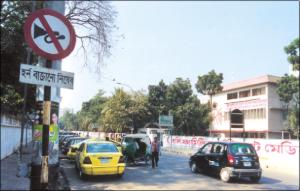Steps to stop wilful honking of horns
Excessive noise is detrimental to schoolchildren and can increase their heartbeat and blood pressure. Other disorders are nausea, dizziness, gastrointestinal problems, tiredness and behavioural troubl
Sohel Islam
The environment and forest ministry will finalise a draft on noise pollution control by December, drawn up by the Department of Environment (DoE)."The draft gives utmost importance to noise pollution cuts in cities," Environment and Forest Minister Shahjahan Siraj said of the Noise Pollution (Control) Rules, 2003 sent to the ministry for approval. "We will call a meeting soon to scrutinise the draft before approval," the minister said, adding the enforcement of the rules will minimise the impulsive honking of horns. The ministries of home, housing and public works, local government, religious affairs and information, the election commission and environment experts, among others, will attend the meeting. Excessive noise is detrimental to schoolchildren and can increase their heartbeat and blood pressure. Other disorders are nausea, dizziness, gastrointestinal problems, tiredness and behavioural troubles such as aggressiveness and sleep disturbance. The draft has zoned the city into small areas for five noise limits: 45 decibels for silent, 50 for residential, 60 for mixed, 70 for commercial and 75 for industrial zones between 6:00am and 9:00pm. The night-time noise limits after 9:00pm are 35 decibels for silent, 40 for residential, 50 for mixed, 60 for commercial and 70 for industrial areas. According to the draft, a primary violator will be fined Tk 5,000 or be jailed for two months or both and the person found guilty on a second count will have to pay Tk 10,000 in fines or serve six months in prison or both. The existing traffic rules can fine violators up to Tk 2,000 for noise pollution or jail them for up to six months each in failure to pay the fines. The draft has blamed lack of public awareness and unplanned urbanisation for the ever-increasing noise in the city. The proposed rules will not be applicable to azan, religious and public meetings, army activities, fire brigade, election campaigns and aircraft. "City dwellers seem to have lost a little of hearing ability," said Shafiquzzaman Khan, a sound quality and comfort researcher and associate professor at the Swedish Royal Institute of Technology. "Noise in much of the city is above the limit prescribed by the US Environmental Protection Agency (USEPA). The agency prescribed 80 decibels as a safe average for 24 hours," he added. "The final draft after revisions, if any, will be sent to the law ministry, which will take necessary steps," said DoE Director General Omar Farque Khan. "We have gone through the noise pollution rules in the neighbouring countries and taken into consideration the cities and towns where noise keeps increasing," he said.
|

A 'no horns' sign opposite Holy Family Red Crescent Hospital. This has no effect on most drivers. PHOTO: Syed Zakir Hossain |